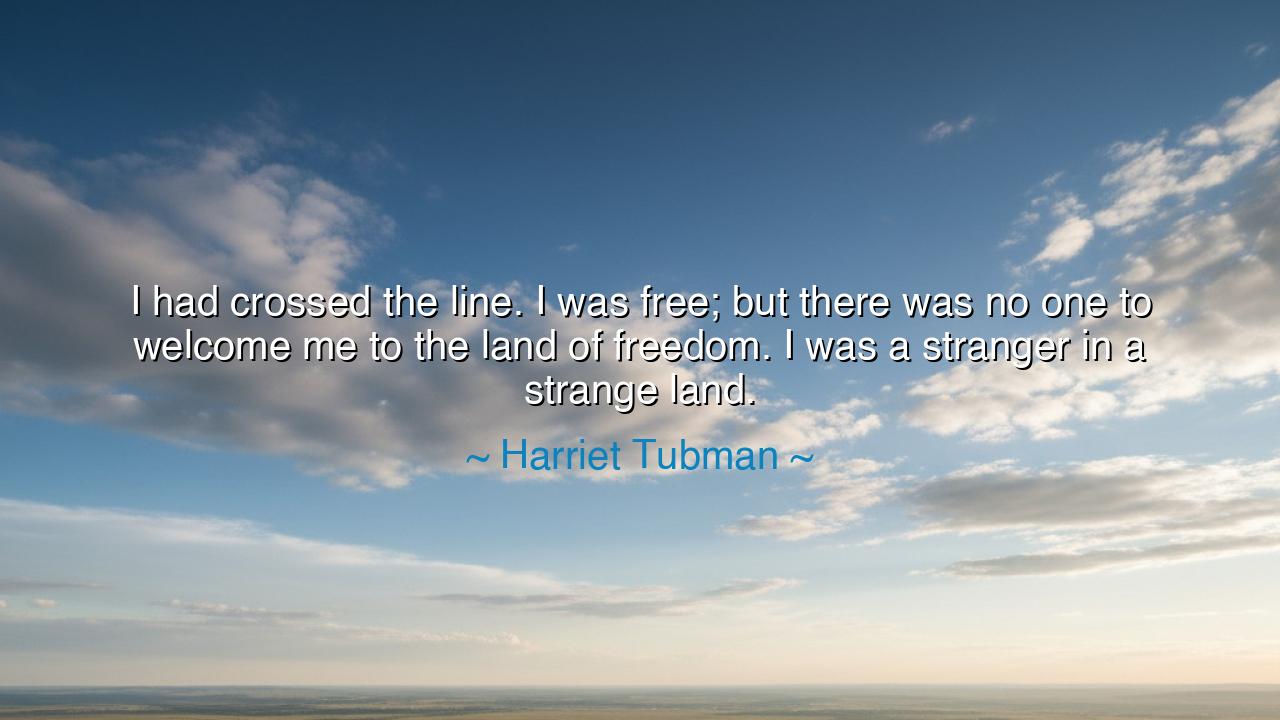
I had crossed the line. I was free; but there was no one to
I had crossed the line. I was free; but there was no one to welcome me to the land of freedom. I was a stranger in a strange land.






Host: The room was quiet, the soft flicker of candlelight casting gentle shadows on the walls. Jack sat at the table, a book open in front of him, but his eyes were distant. Jeeny, sitting across from him, noticed the far-off look in his eyes and set her cup of tea down, sensing something on his mind.
Jeeny: (gently) “You’ve got that faraway look again. What’s going on?”
Jack: (looking up slowly, his voice soft) “I was just reading a quote from Harriet Tubman. She said, ‘I had crossed the line. I was free; but there was no one to welcome me to the land of freedom. I was a stranger in a strange land.’ It really struck me — the feeling of freedom, and yet the loneliness that comes with it. How even when we achieve freedom, we can feel isolated and disconnected.”
Host: Jeeny leans forward, her eyes reflecting the weight of the quote. The quiet of the room deepens as she processes what Jack said, and her fingers lightly trace the rim of her cup.
Jeeny: “That’s a powerful image, isn’t it? The idea that freedom doesn’t always come with a warm embrace. Even though she had escaped, she was still left in an unfamiliar place, without the support or recognition she might have hoped for. It’s like she was free, but that freedom came with a sense of alienation, of not knowing where she belonged.”
Jack: (nodding) “Exactly. Tubman’s words remind us that freedom isn’t just a physical release — it’s an emotional and psychological journey, too. Sometimes, when we break free from something, even if it’s for the better, there’s still the weight of being alone in that new space, without the comfort of what was once familiar.”
Host: The air in the room feels heavier now, as if the conversation has shifted into something deeper, more personal. Jeeny sits back, her expression soft, contemplating the complexity of freedom and the human experience.
Jeeny: “It makes me think about how freedom isn’t always as simple as it seems. It’s not just about being free from constraints or oppression; it’s about what comes after, how we navigate the unknown. Sometimes, freedom can feel more like a burden than a relief — especially when you’re alone, without a clear path or support.”
Jack: (quietly) “Yeah, that’s the hard part, isn’t it? The space between liberation and finding belonging. We often think of freedom as the ultimate goal, but once we get there, we have to figure out who we are and where we fit in this new reality. It’s a kind of limbo — no longer trapped, but not fully embraced, either.”
Host: Jeeny’s eyes soften as she reflects on the deeper layers of what Jack is saying, her voice quiet but filled with understanding.
Jeeny: “I think that’s why finding community is so important in the journey of freedom. It’s not just about gaining freedom — it’s about finding people, places, and connections where you can feel like you belong again. Like, it’s not enough to just escape; you have to find a place where you can feel seen, valued, and part of something.”
Jack: (nodding) “Exactly. And sometimes, the hardest part of freedom is learning to rebuild your life, to reshape your identity without the constraints you once had. It takes courage to step into that unknown, but it also takes the support of others to truly feel that you’ve found your place.”
Host: The room settles into a quiet understanding, both Jack and Jeeny lost in their thoughts. The idea that freedom, while deeply empowering, can also be a path to loneliness and disconnection resonates between them.
Jeeny: “I think that’s why solidarity is so important. People who have experienced hardship or struggle often have a unique bond because they know what it feels like to be isolated or oppressed. When they come together, they can help each other navigate the complexities of freedom — they become the welcome, the support, and the place of belonging.”
Jack: “Yeah. Freedom isn’t just about breaking away from something; it’s about rebuilding, finding new meaning and purpose in the aftermath. And sometimes that means finding new connections and new ways of relating to the world.”
Host: The conversation comes to a peaceful pause, the understanding that true freedom isn’t just the absence of oppression, but the presence of community, support, and the chance to rebuild a life with purpose. Harriet Tubman’s words, while reflecting the harsh reality of her own journey, remind us that the road to freedom is both liberating and complicated, and that true freedom is a journey shared, not walked alone.






AAdministratorAdministrator
Welcome, honored guests. Please leave a comment, we will respond soon